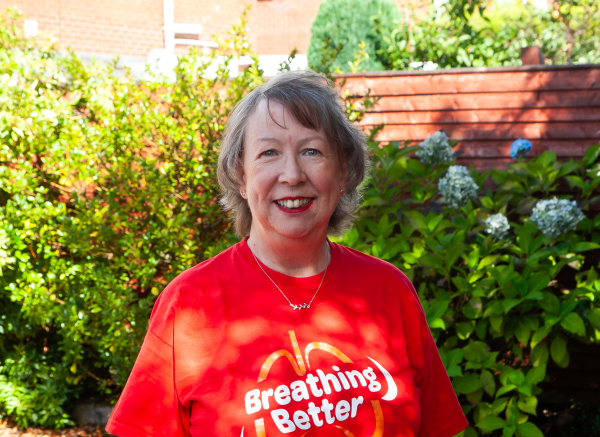
Bronchiectasis is a long-term condition where the airways of the lungs become widened, leading to a build-up of excess mucus that can make the lungs more vulnerable to infection. Maggie Hogg from Newtownabbey lives with the condition and is sharing her story to raise awareness of this often-little-known condition.
Maggie says; “I was diagnosed in February 2016 at Antrim Area Hospital. When the Consultant told me I had bronchiectasis it went over my head because it wasn't a word I had ever heard before. I couldn't spell it; I couldn't say it. To be honest, I didn’t give it too much thought that day, I just thought it was something like bronchitis.”
“What prompted the investigation into my heath was that every time I had a cold, it would then develop into a chest infection, and I would be off work for three to four weeks which was starting to cause issues with my employer. I went to my GP and explained I was worried I was going to lose my job because of the time I had to take off on a regular basis. He referred me for an MRI and that uncovered the bronchiectasis in my lungs. It explained everything because I was starting to think, ‘am I really this ill, am I imagining things?’. In the end I had to take early medical retirement from work.”
Talking about her diagnosis Maggie explains; “Initially I didn’t think too much about my diagnosis but after the first chest infection I had post-diagnosis I thought I had better start reading up on this thing. That’s when it hit home that bronchiectasis is a lifelong condition.”
“I was given inhalers but there has been a lot of just having to live with the condition and find out for myself what works and what doesn’t. Taking antibiotics and rest is really all I can do when I get ill. I do believe I've had bronchiectasis for a long time; I just didn't know it.”
“At first I wasn’t keen on telling others about my condition as I looked at it as a weakness, but when the pandemic hit, I got a shielding letter, and I had to tell people as I was stuck in the house.”
“Another thing that is difficult with this condition is that the side effects are not nice, such as coughing and phlegm. I don't like people seeing or hearing me when I'm having a flare up and that can be isolating.”
Speaking about the support she has received from Northern Ireland Chest Heart & Stroke (NICHS), Maggie says; “I completed pulmonary rehab at Whiteabbey Hospital in 2018 and was then referred to NICHS. One of the Care Services Coordinators contacted me to say they were setting up a group to support people affected by respiratory illnesses and would I be interested in coming along. I started going to the group and found it was great to talk to other people with similar conditions. They understood what I was talking about, knew how I felt, and mentally it was a big help.”
“It’s hard being diagnosed with a condition but even more so when it’s one you, and others, haven’t heard of before. For example, I go to a women’s group where they do a lot of dancing and kindly, they want me to take part, but I get too breathless and it’s hard having to keep explaining that to people. Even talking can cause me to be breathless, especially in noisy environments. When I say I have bronchiectasis, people will say things like, ‘I get bronchitis all the time too’, and they just don’t understand my condition is totally different.”
“People mean well but they don’t understand. On the other hand, when you are with others at the NICHS groups that have the same condition or something similar, you can talk about things, and they know what it's like. That’s really helpful.”
“Once the pandemic hit the group obviously had to stop meeting but saying that I got great support from NICHS. I received regular phone calls checking how I was, and I appreciated that. When the charity contacted me last year to say they were hoping to start a new Breathing Better Wellness Session I was delighted and I continue to go to the group now. I have also completed the Taking Control Self-Management Programme which provides a range of skills to help you to manage your condition better and improve your confidence.”
“I was also part of the Inspire Choir for a while too, but it doesn’t fit with my schedule now unfortunately. Singing helps improve breathing and general lung function and it definitely does release happy endorphins; I so enjoyed it!”
“I have got a lot out of the support I’ve received from NICHS, and I am managing my condition well these days. I would definitely recommend other people get in touch with the charity and see how they might be able to help them too.”
